by TOM MAY
Play for Today Writer: David Edgar; Producer: Margaret Matheson; Director: Mike Newell
This essay continues from Part 2.
Part 3: Analysis of Destiny and its afterlife
Please note that, in order to explore this programme and its political context, this essay quotes racially offensive language.
Visual motifs, setting, culture and class
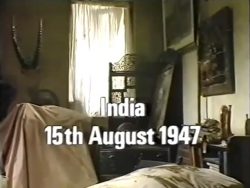
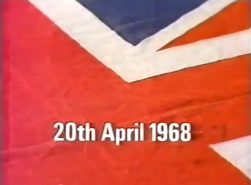 In its adaptation to television, the play’s text was sometimes faithfully translated, but Edgar made significant alterations and changes of emphasis. The medium is used to historicise the play with exact dates – “15th August 1947”, “20th April 1968”, “19th June 1970” and “1977” – being presented. The stage version’s text does not as clearly indicate the year of the contemporary scenes.
In its adaptation to television, the play’s text was sometimes faithfully translated, but Edgar made significant alterations and changes of emphasis. The medium is used to historicise the play with exact dates – “15th August 1947”, “20th April 1968”, “19th June 1970” and “1977” – being presented. The stage version’s text does not as clearly indicate the year of the contemporary scenes.

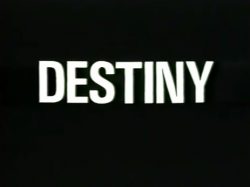 The forces of right-wing politics are resurgent; immigration is regularly discussed on the airwaves and the phrase “foreign workers, coming over here, taking our jobs” circulates obstinately. Those on the political left seem implacably divided. It could be 2017. It is, however, 1977 as depicted by David Edgar in Destiny. This Play for Today, which he adapted for television from his acclaimed theatre production, analyses how and why the far-right National Front was becoming a genuine political force in 1976-77. Edgar portrays the intersection of politics with human lives; his Brecht-influenced dramaturgy is accompanied by a close attention to British places and voices. Part one of this three-part essay will consider Edgar’s background and Destiny’s history as a stage play and will place the television play in its historical and televisual contexts. Part two will consider the television play’s casting and production and its reception by critics, BBC management and audiences. Part three will analyse this neglected entry in the eighth series of Play for Today in relation to debates over docudrama forms and naturalism. The essays will analyse its status as an adaptation, with close readings of how emphases were changed in making the play for television. The television Destiny will also be analysed as a contribution to debates on national and class identity and for its representations of a range of British political ideologies in the 1970s.
The forces of right-wing politics are resurgent; immigration is regularly discussed on the airwaves and the phrase “foreign workers, coming over here, taking our jobs” circulates obstinately. Those on the political left seem implacably divided. It could be 2017. It is, however, 1977 as depicted by David Edgar in Destiny. This Play for Today, which he adapted for television from his acclaimed theatre production, analyses how and why the far-right National Front was becoming a genuine political force in 1976-77. Edgar portrays the intersection of politics with human lives; his Brecht-influenced dramaturgy is accompanied by a close attention to British places and voices. Part one of this three-part essay will consider Edgar’s background and Destiny’s history as a stage play and will place the television play in its historical and televisual contexts. Part two will consider the television play’s casting and production and its reception by critics, BBC management and audiences. Part three will analyse this neglected entry in the eighth series of Play for Today in relation to debates over docudrama forms and naturalism. The essays will analyse its status as an adaptation, with close readings of how emphases were changed in making the play for television. The television Destiny will also be analysed as a contribution to debates on national and class identity and for its representations of a range of British political ideologies in the 1970s.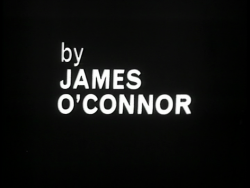 James O’Connor – often known as Jimmy O’Connor – wrote a number of popular and successful television plays in the 1960s and early ‘70s, regularly collaborating with director Ken Loach. He had an unusual background for a television dramatist. He was formerly a career criminal who had turned to writing while serving a life sentence for murder, having narrowly avoided being hanged.
James O’Connor – often known as Jimmy O’Connor – wrote a number of popular and successful television plays in the 1960s and early ‘70s, regularly collaborating with director Ken Loach. He had an unusual background for a television dramatist. He was formerly a career criminal who had turned to writing while serving a life sentence for murder, having narrowly avoided being hanged. 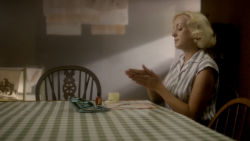 Call the Midwife often makes skilful use of editing to interweave its lead characters with its guest characters. This aids storytelling, heightens our understanding of characters in their social environment and at times even complicates the position of the midwives in that environment. This essay will explore editing and other aspects of form in two sequences from Call the Midwife series two episode five, to explore the ways in which the problems of guest character Nora Harding are interwoven with two lead characters: the first sequence is a well-executed piece of storytelling, whilst the second is an extraordinary use of technique to devastating effect.
Call the Midwife often makes skilful use of editing to interweave its lead characters with its guest characters. This aids storytelling, heightens our understanding of characters in their social environment and at times even complicates the position of the midwives in that environment. This essay will explore editing and other aspects of form in two sequences from Call the Midwife series two episode five, to explore the ways in which the problems of guest character Nora Harding are interwoven with two lead characters: the first sequence is a well-executed piece of storytelling, whilst the second is an extraordinary use of technique to devastating effect.